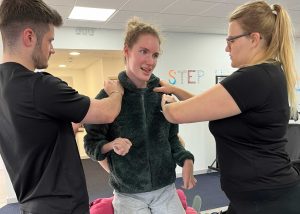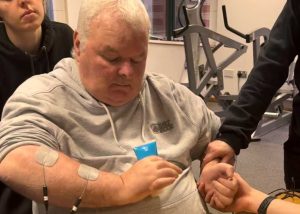While out playing with her friends, Scarlett was struck by an extremely rare condition that subsequently left her paralysed from the chest down.
“One evening at the end of September, after being out playing, Scarlett said her legs felt ‘a bit funny’. We put it down to growing pains, as you do. But the next morning Scarlett said she ‘didn’t feel well’ which was very unusual. She went to the toilet and simply couldn’t stand back up.” Michael, Scarlett’s father
Scarlett’s parents took her to hospital straight away. Tests were undertaken as a urinary tract infection was suspected. This quickly changed to the belief that a bug was attacking Scarlett’s body and she was rushed to St George’s Hospital in Tooting. It was here they detected a ruptured cavernoma on Scarlett’s spine, an abnormal group of raspberry-shaped blood vessels which can appear in the brain or attached to the spinal cord.
“That evening, only 24 hours after Scarlett first felt unwell, a specialist called Sara and me to say they had to operate immediately, or Scarlett could die. The operation took between four and five hours with no one being able to say what Scarlett’s future would be. We simply didn’t know if she would regain movement in her body.
“Within the space of 48 hours Scarlett had gone from riding her bike to lying flat, sedated, in a hospital bed, not knowing what was going on. It was the middle of the Covid lockdown – only one of us could be with her. It was horrendous and terrifying for a 10-year old,” says Michael.
When Scarlett eventually came around, she immediately pulled the assisted breathing tube from her mouth, signalling she had retained some form of movement.
Scarlett spent four weeks at St George’s Hospital before spending a further 10 weeks at Stanmore (The Royal National Orthopaedic Hospital) where she learned coping mechanisms for how to live her life in a wheelchair.
Once Scarlett came home it became clear she needed more help. Regular weekly physio sessions weren’t addressing her very individual needs. Michael trawled the internet and was preparing himself and his family for having to go to the United States, as this seemed to be the only place offering ground-breaking spinal cord rehabilitation. Then, he found Neurokinex.
“They were offering extraordinary therapies and also had a Step Up Scheme which gives six free sessions to newly injured people. We had nothing to lose so we booked Scarlett in – and we haven’t looked back!
“They do phenomenal work at Neurokinex. Her trainers, Marilla and Lucy, had Scarlett doing all sorts – balance, core stability, transfers to and from sitting. She also uses the Locomotor Training specialist treadmill device that allows her to walk assisted and suspended. It’s the only one in the country and if it wasn’t here, we would have needed to fly to the US to access this therapy.
“I can’t speak highly enough of the team at Neurokinex: it’s an amazing place. The trainers combine incredible people skills with fantastic therapeutic abilities: they are amazing people.”
Despite her own life-changing injury, Scarlett finds strength from her inspirational Instagram account which is charting her journey, experience and progress. Her aim is to help others who may find themselves in a similar situation. She is a remarkable young lady: you can see more here: @scarlettsjourney2020.




